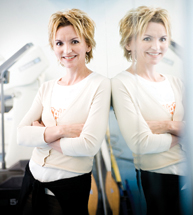Marie-Claude Després: The circus of physiotherapy
Marie-Claude Després: The circus of physiotherapy McGill University
User Tools (skip):
PROFILE
Marie-Claude Després: The circus of physiotherapy

Marie-Claude Deprés stays in shape by doing yoga and Pilates, and working with upwards of 14 patients a day.
Claudio Calligaris
Marie-Claude Després thinks pain can be a good thing. That's a surprising statement coming from a physiotherapist practising at the McGill Sports Medicine Clinic, but Després' explanation is convincing:
"Some of my former patients have told me physiotherapy has changed their lives. Their injury and then the physio they do makes them look at their body in a new way. After participating in the healing process, they are motivated to start exercising properly. You're not just fixing somebody, you're helping them change their experience of their body."
After 16 years as a physiotherapist, Després has earned the right to wax philosophical about her profession. She trained at l'Université Laval, earning degrees in kinesiology and physiotherapy, and before joining McGill's Pine Ave. clinic five years ago, she logged time providing physiotherapy services for a professional hockey players and the troupe of the theatrical production "Notre Dame de Paris," among other clients. Her most glamorous and demanding stint yet was as the in-house physiotherapist for Cirque du Soleil.
Després spent five years touring with the phenomenally popular show, working 12-hour days, six days a week, helping performers manage their injuries. As the show toured the world, stopping in such far-flung locales as Hong Kong, Sydney and New York, Després found herself in a near-constant state of culture shock. While she hasn't forgotten the physical and emotional tolls her former fast-paced and transient lifestyle exacted, she looks back on her time with Cirque du Soleil with more gratitude than horror.
"You always miss an experience like that, because of the adrenaline and the stimulation. But it made me grow, become flexible. Now it takes a lot for me to panic. Sometimes I say that to my patients — 'Hey, I went off to war. Don't worry!'"
What the McGill Sports Medicine Clinic lacks in exoticism, it makes up for in its spirit of teamwork, according to Després. She praises her present workplace's efforts at coordinating complementary treatment methods: physiotherapists, athletic therapists, massage therapists, an osteopath and an acupuncturist all work together to provide each patient with the service best suited to their specific case. Indeed, Després is a firm advocate of therapy that addresses both the physical and psychological profile of her clients.
"An injury is always affected by your mood," she muses, "and by what's going on in your life. This has to be discussed with your client, and you have to consider their age, their physical condition. The same injury will be managed differently, depending on the kind of person they are." The integrated approach of the clinic, therefore, makes it a "winner for patients," in Després' opinion.
Besides serving McGill's students and staff, the clinic also accepts patients from the greater Montreal community. The one requirement is that their maladies be sports-related. Seasoned athletes and weekend warriors alike find respite within the clinic's walls. Després feels that those who are dedicated to a consistently active lifestyle are the most motivated to participate in their healing process because they want to get back onto the court or field, or back into the pool. She adheres to the pro-exercise school of physiotherapy: "The body is a machine," she says, "and the body needs to move" — and that means even when a person is healing. "My patients have a lot of homework to do!" she jokes.
Després sees between 12 and 14 clients a day. Every new case is a sort of practical education for her, but she also hones her theoretical know-how by enrolling in training courses every year. So what does a woman who practices physiotherapy all day do in her spare time? She works out, of course. Yoga, Pilates and biking help her cool down after a day at the clinic and make her more able to bear her workload.
"If you don't work out, you don't last long as a physio in sports medicine. It's a very physically demanding job."

